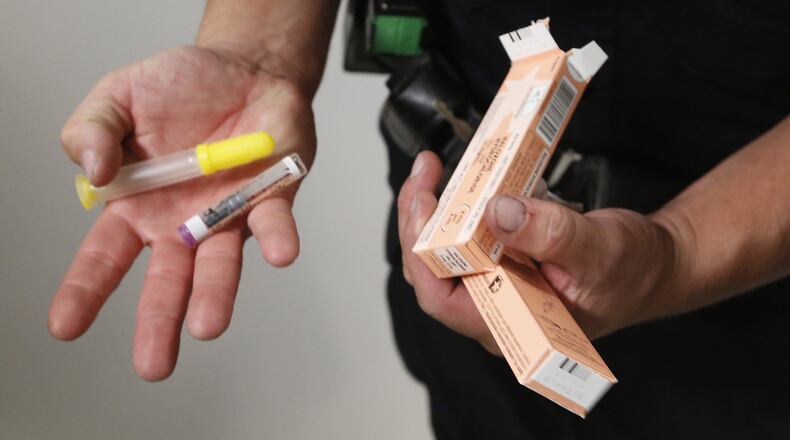Local medical teams are urging police to wear gloves when encountering drug suspects and members of the public who come in contact with drug users to carry naloxone, the drug sold under the brand name Narcan that can reverse an opioid overdose.
RELATED: Ohio cop overdoses after drug stop
The officer’s near-fatal overdose occurred after he brushed the substance off his uniform, according to a police report, which noted it took four doses of Narcan to revive the officer.
The incident highlights the danger to police and the public of accidental exposure to fentanyl, which is 50 to 100 times more powerful than heroin, according to COAT, which is led by Montgomery County Alcohol, Drug Addiction and Mental Health Services.
RELATED: Opioid drugs claiming children's lives
But fentanyl isn’t the only illicit street drug with the same deadly attributes. Carfentanil — which has been used as an elephant tranquilizer — sufentanil, acrylfentanyl, furanylfentanyl and other powerful opioid drugs can also be absorbed through the skin or by inhalation, according to Dr. Jason Pickett, an emergency physician at Miami Valley Hospital, and a member of The Greater Miami Valley Emergency Medical Services Council (GMVEMSC).
Pickett said the GMVEMSC recommends that police officers and other first-responders at a minimum wear gloves to protect themselves during operations such as traffic stops, drug buys or arrests, and rescues.
RELATED: Stark number of ER visists shows heroin's local grip
“You never know when you’re going to stick your hand in somebody’s pocket and touch a bag of white powder that could absorb through the skin,” he said. “It is already standard practice for EMS to wear gloves for all patient contacts. It would be prudent for police to do the same when performing searches.”
Still, Pickett was quick to acknowledge that wearing gloves isn’t always enough, pointing to an incident last fall in which SWAT officers raiding a building in Hartford, Conn., were sickened after they breathed in heroin powder kicked up by a flash-bang grenade.
“For respiratory protection, I don’t believe it is either practical or necessary for police to wear masks for every contact with the public,” Pickett said. “But if there is a good chance that drugs will be handled in large quantity or aerosolized by noise-flash distraction devices, then wearing respiratory protection would be a good idea.”
The lethality of opioid drugs is clear.
RELATED: Overdose epidemic: 6 things that explain crisis
A recent report by Wright State University found that of 100 overdose deaths reviewed, 99 percent had illicit fentanyl in their systems. The drug is potentially lethal in even very small quantities, and first-responders are not the only people at risk of exposure.
“We’re trying to make the public aware of the ever-increasing strength of the drugs found on the street, and to be aware that if they come in contact with someone who is overdosing to take precautions,” said Dan Suffoletto, a spokesman for Public Health - Dayton and Montgomery County. “We certainly want them to call 911, but often times, the people who come in contact with people overdosing, come in contact before first-responders even arrive.”
Suffoletto said anyone who is likely to come in contact with a person who uses opioids should consider carrying Narcan. Information on how to use and obtain Narcan can be found by contacting Project DAWN, a community-based overdose education and naloxone distribution program or Montgomery County’s syringe services program, CarePoint.
About the Author
